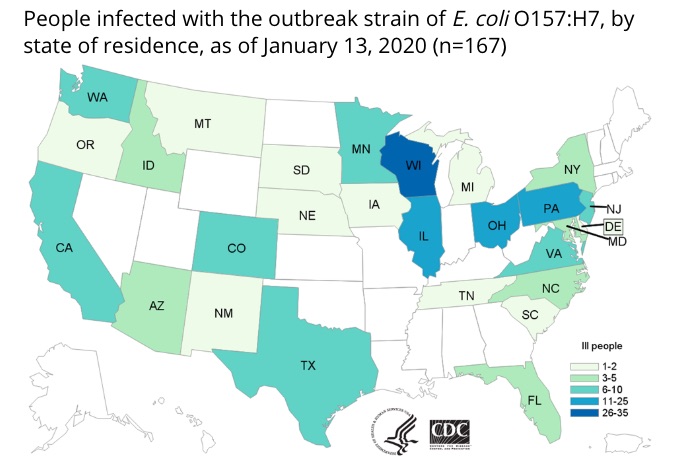Consumers no longer need to avoid romaine lettuce from Salinas, CA as the lettuce growing season there has ended bringing about the de facto end to a months-long romaine lettuce E. coli outbreak, according to the Centers for Disease Control and Prevention (CDC). “This outbreak is the third in three years to be caused by the same strain of E. coli in romaine lettuce from Salinas and it’s the third in three years to end unresolved,” said Food Safety Lawyer Fred Pritzker.
This outbreak, which began in September 2019, spread to 27 states sickening 167 people. Eighty-five people were hospitalized, 15 of whom developed hemolytic uremic syndrome (HUS), a form of kidney failure associated with E. coli infections. Two other outbreaks, one in 2018 that sickened 62 people and one in 2017 that sickened 25, were caused by the same strain of E. coli. When each of those outbreaks ended, the U.S. Food and Drug Administration (FDA) stated it had been unable to identify a common grower, supplier, distributor, or brand of romaine lettuce that could explain all of the illnesses. And that’s essentially the same outcome this time around.
Contact the Pritzker Hageman E. coli Team
Phone: 1-888-377-8900 | Text: 1-612-261-0856
In its report on the outbreak released today, the FDA stated that its investigators combed through hundreds of supply chain records. Through those efforts, the agency was able to narrow the origin of the romaine in question to 10 fields in the lower Salinas Valley. Tests on samples from those farms were negative for the outbreak strain of E. coli except for one taken from a “run-off point in a buffer zone between a field where product was harvested and where cattle are known to occasionally graze.”
The FDA stated it will continue its investigation and will conduct another “root-cause investigation” with the goal of outlining preventative measures that could prevent future outbreaks.
Although tests on samples from the farms were a dead end, the outbreak strain was found in actual products and one recall was issued. ln Maryland, a cluster of illnesses was linked to Ready Pac Bistro Bowl Caesar Chicken Salads sold at Sam’s Club stores. After state health officials found the outbreak strain in an unopened package at a patient’s home, Missa Bay issued a recall of the pre-packaged romaine salads containing meat and chicken.
Weeks later, the Wisconsin Department of Health Services found the outbreak strain of E. coli O157:H7 in an unopened bag of Fresh Express brand Leafy Green Romaine collected from an ill person’s home. Fresh Express did not issue a recall.
The people sickened in this outbreak range in age from less than 1 year to 89 years old. The number of cases reported for each state is as follows: Arizona (4), California (8), Colorado (6), Delaware (1), Florida (4), Iowa (1), Idaho (4), Illinois (15), Maryland (5), Michigan (2), Minnesota (7), Montana (1), North Carolina (3), Nebraska (2), New Jersey (9), New Mexico (2), New York (3), Ohio (12), Oregon (1), Pennsylvania (21), South Carolina (1), South Dakota (1), Tennessee (1), Texas (6), Virginia (6), Washington (6), and Wisconsin (35).
The E. coli lawyers at Pritzker Hageman have represented clients in every major E. coli outbreak in the last 20 years. Our clients from this outbreak include a teenager who developed HUS. If you would like to request a free consultation with our experienced E. coli Team, please call us at 1-888-377-8900, text us at 612-261-0856 or, fill out the form below.
